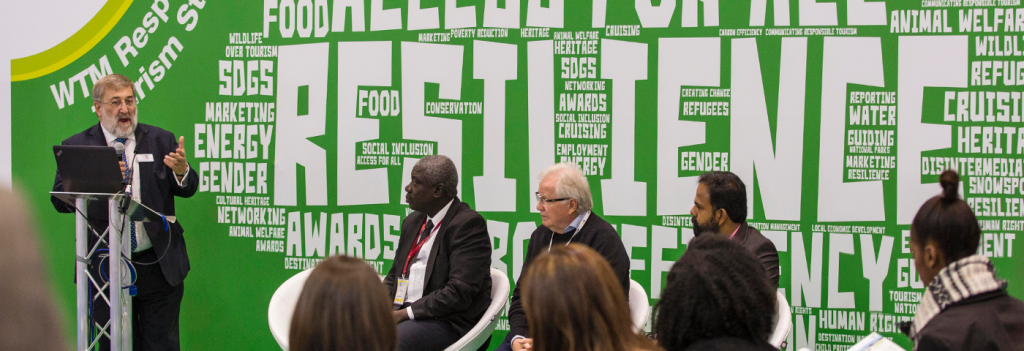With a new Responsible Tourism Theatre in the Africa Section (AS580) the Responsible Tourism programme is now firmly established down on the show floor. An experiment last year it was successful in reaching many people new to the issues and the solutions. This year we are experimenting with running the programme back to back, there will be constant activity in the theatre throughout the show, come along when you can.
With 28 sessions over the three days it is impossible to do justice to the programme here. The sessions cover many of the issues which Responsible Tourism addresses: carbon, water, overtourism, certification, engaging travellers, place management, human rights, pollution, slum tourism, travel writing, human wild animal interactions, the future of the Responsible Tourism Awards, transforming tourism, accessibility for all and marketing.
There are three sessions focussed on destinations: Responsible Tourism in China, efforts being made to increase the benefits to the poorest people living around Bwindi Impenetrable Forest Park in Uganda and Kumarakom in Kerala, India where there has been the first ever census of the impacts of tourism in a village and we have Coconut Village Lagoon, also in Kumarakom, talking about their impacts there.
Fifteen years on since the Cape Town Declaration on Responsible Tourism in Destinations in 2002 we are reflecting on how much progress has been made and setting the agenda for the next five years. How far have we come? What has been achieved? What should be our priorities for the next five year? We want to gather your views to contribute to the discussions, come along and have your say and vote online – we’ll be revealing the results of the poll during the session at 13:00 on Tuesday.
Amongst this year’s highlights are the SDGs and the Awards, human rights and orphanages, and the challenge of plastic pollution. As we come to the end of the International Year of Sustainable Tourism for Development we focused the WTM Responsible Tourism Awards on the UN’s Sustainable Development Goals and we are debating them with industry leaders and the UNWTO immediately before the Awards are presented on Wednesday morning on World Responsible Tourism Day.
The issue of plastic pollution, a significant amount of it resulting from the activities of the travel and tourism sector, is becoming acute. Incredible Oceans have an installation adjacent to the Responsible Tourism Theatre which conveys some of the impacts of our non-biodegradable rubbish in our oceans and in the fish we eat. Scientists are beginning to argue that plastic will define the next geological era, the Anthropocene epoch.
This year we have two important, related sessions on children, trafficking, human rights and orphanages, both on Tuesday. At 11:45 we have a panel which will explain how tourism grows market demand for orphanages resulting in “paper orphans”, often trafficked children. The speakers will explain why the industry should neither be marketing orphanage tourism, nor encouraging or facilitating visits to orphanages. If we do then we encourage the “orphaning” of children, unintentionally or not. At 15:15 we’ll be looking, with the Border Force and an expert panel, at what the industry can do to prevent our infrastructure being used to traffic people into slavery. There was a recent House of Lords meeting on the issues – the resulting agenda for action will be reported during this session in the Responsible Tourism Theatre.
Next year’s WTM London will have coping with success and the challenge of overtourism as the major themes, overtourism is the antithesis of Responsible Tourism. This year we have sessions on coping with success on Scottish islands and the Brackenbury panel interview, in the Responsible Tourism Theatre on Monday, is addressing the challenge of overtourism with a particular focus on Barcelona and Venice. This year’s Ministers’ Summit at WTM is also addressing overtourism. The issue is going to affect more destinations and become more acute. After all, overtourism occurs when we fail to make tourism sustainable, when we fail to take responsibility.
You can find the whole programme online.
